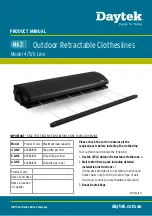
NB. The AXA Remote is only intended for items with a
residential or office purpose.
AXA Remote 2.0
37-341 (11-13)
EMC 2004/108/EC
4
Remote-controlled window opener
for centre-pivot roof windows
T
U
S
Final assembly
23
Then tighten the bolts on the left and right hand sides to secure
the closing unit (figure
Q
).
24
Once again, check whether the window opens and closes
properly by fully closing and opening the window once.
Repeat step 22 if the window does not flow or close
properly.
25
Slide the cover
4
on to the closing unit, from front to back,
until it goes no further (figure
U
).
26
The AXA Remote 2.0 is ready for use.
Adjustment of the ventilation control bar, if applicable
27
The user can choose to leave the ventilation control bar entirely
open, half open or closed. If the ventilation control bar is
entirely open, it can be closed by pushing the locking mechanism
catches apart (figure
V
).
Problem-solving
The window does not close
• Disconnect the chain from the window and check that
the window does not become stuck and operates without
problems.
• Check that installation steps have been followed correctly.
• The batteries may be flat (have insufficient power). Replace
the batteries in the unit and/or remote control (figure
C
).
• The unit has been configured too tightly. The closing unit
may (for example, due to the wood setting our because
of temperature differences) not properly close the window
in certain cases, if it has been configured too tightly.
Remove the 2 outer screws (figure
Q
) from the closing
unit. Turn the adjustment screw fully to the right (figure
T
).
Repeat step 21to/incl. 24. Mount the 2 outer screws on to
the window unit once again.
The unit does not react or reacts insufficiently
• Temporarily remove the batteries or remove the adapter
plug from the power socket and wait 2 minutes. Press a
button on the remote control as if you are about to use
the unit. Replace the batteries or the adapter.
Now try to use the unit by pressing one of the buttons on the
remote control.
Unit does not immediately respond to the remote control,
sleep mode
• To save energy, the unit switches to sleep mode after a
certain period of time; that is why you sometimes need
to press twice on the remote control to activate the unit.
• Environmental factors could have an impact on the range of
the remote control. Full sun, TL lighting very close to the
front of the unit or a dusty/moist environment could
reduce the operating range. In this case, you must move
closer to the closing unit to operate it.
• The batteries may be flat (have insufficient power). Replace
the batteries in the unit and/or remote control.
Replace batteries
Low-battery indicator
• If the LED starts to flash red/green intermittently, this
means the batteries need to be replaced very soon.
The AXA-Remote will always ensure that the last remaining
power in the batteries is used to close the window.
• Open the cap of the unit and remove the 4 flat batteries.
Insert 4 new batteries (AA) as identified in this assembly
manual
(figure
C
).
Only use good alkaline AA batteries (do not use
rechargeable batteries)
Configure multiple units with the same remote control
• Briefly remove the batteries from the to-be-configured
window unit or briefly remove the adapter from the power
socket and wait 2 minutes. Replace the batteries or the
adapter. Continue to configure the remote control so long
as the LED light remains green (20 seconds) (see figure
C
).
V
Locking mechanism
Ventilation control bar
Ventilation capacity
According to NEN 1087 and NEN 8087, which identify minimum
ventilation per area, the AXA Remote 2.0 complies with the
minimum ventilation capacity of 25 m3/hour per area, based on
a window surface area of 0.26m2. Due to its many opening
possibilities, the AXA Remote 2.0 is also suitable for aeration.
For the mentioned window size, each AXA Remote 2.0 is able to
sufficiently ventilate an area of 22.5 m. The AXA Remote 2.0
also complies with the capacity guideline established in NPR
1088 because it enables continuous opening and closing. This
allows the required ventilation to be arranged.





















